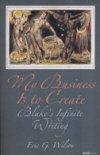My Business Is to Create
If you don’t know much about the work of William Blake, Wilson will make you want to read him. If you know a lot about Blake, this book will make you want to read Wilson. He writes beautifully. He does an exceptionally fine job of summarizing Blake’s bio, elucidating Blake’s ideas on inspiration and the creative process, and he surprises his own readers by telling a personal story of struggles with the creative process, without actually focusing on himself or his personal story. The book is informative, inspiring, and intensely pleasurable. It’s also under, rather than over written, yet manages to be exuberant and full-bodied (in other words not deliberately cryptic).
If you don’t know much about the work of William Blake, Wilson will make you want to read him. If you know a lot about Blake, this book will make you want to read Wilson. He writes beautifully. He does an exceptionally fine job of summarizing Blake’s bio, elucidating Blake’s ideas on inspiration and the creative process, and he surprises his own readers by telling a personal story of struggles with the creative process, without actually focusing on himself or his personal story. The book is informative, inspiring, and intensely pleasurable. It’s also under, rather than over written, yet manages to be exuberant and full-bodied (in other words not deliberately cryptic).
Without name dropping for the sake of appearing erudite or as filler (the book is a mere 112 pages), Wilson links Blake and his ideas on and experience of the creative process to dozens of artists and great thinkers, among them Dante, Allen Ginsberg, Swinburne, Yeats, Dylan Thomas, Aldous Huxley, Alicia Ostriker, Hilda Doolittle, Charles Olson, Kathleen Raine, Benjamin Britten, R. Crumb, Walker Percy, Martin Buber, H.G. Wells, Annie Dillard, Borges, Milton, Adrienne Rich, Emerson, Basho, Hemmingway, Kant, Melville, Joyce, C.S. Lewis, and Ken Kesey. References, quotes, and ideas of these writers and others are woven seamlessly into Wilson’s brief text, always in a natural and logical fashion and always with good reason.
Wilson’s personal struggle to write and his relationship to the act of composition render utterly immediate and intimate the effort to create, while the presentation of Blake’s bio, interpretations of his poems, and a more general discussion of Blake’s poetics put Wilson’s issues in a larger context:
To write well is to adore the bright line, the translucent sentence that reveals what is true, right now, about this one thing. What is true is that this being is this self-contained entity and nothing else besides. But within the boundaries of the thing’s area and volume are countless minute particulars that themselves differentiate into further infinitesimal particles and these do the same, and so on, interminably. And so writing with excellence is loving not just the line but also what escapes design, always just beyond semantics and syntax, trope and tractate. Lively writing requires nothing less than a passion, perverse maybe, for the fragment bereft of finish, hunger beyond filling, constant privation.
Finally, he concludes: “Unrequited longing engenders the imagination’s plenitude.” What I long for is another book by Eric G. Wilson.





